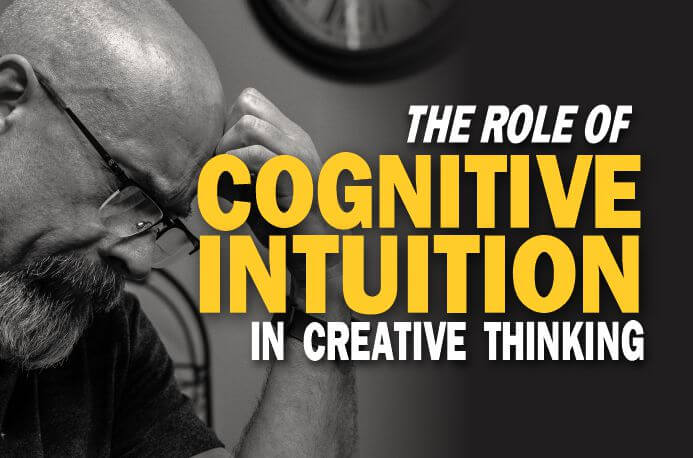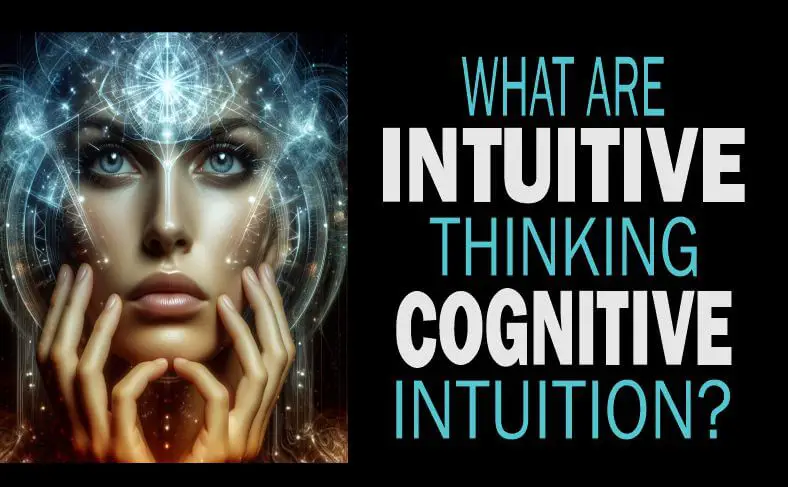Last updated on April 14th, 2024 at 05:45 am
Explore the power of intuitive thinking and cognitive intuition for decision-making and problem-solving, powered by the subconscious mind.
The human mind is a complex and fascinating organ that is capable of incredible feats.
While we often attribute our rational thoughts and decisions to conscious thinking, there is a whole other realm of mental processes happening beneath the surface.
This realm is known as cognitive intuition in tandem with intuitive thinking, the ability to make quick and accurate decisions based on subconscious information and patterns.
In this straightforward article, we will discuss the concepts of cognitive intuition and intuitive thinking as one entity, their underlying mechanisms, examples of their usage, and strategies to develop and enhance these powerful tools.
Table of Contents
- What are Intuitive Thinking and Cognitive Intuition?
- Intuitive Thinking and Cognitive Intuition: The Power of the Subconscious Mind
- Psychic Intuitive Thinking
- The Mechanisms Behind Intuitive Thinking
- Importance of Cognitive Intuition
- The Science of Cognitive Intuition
- 10 Examples of Intuitive Thinking
- Enhancing Intuitive Thinking and Cognitive Intuition
- Limitations of Intuitive Thinking
- Frequently asked questions
- Conclusion
What are Intuitive Thinking and Cognitive Intuition?
Definition of Intuitive thinking
Intuitive thinking is a semi-conscious and deliberate form of intuition.
It involves using intuition as a cognitive tool to problem-solve, make decisions, or generate creative ideas.
Intuitive thinkers actively engage their intuition and rely on gut feelings or instincts in their thought processes.
Cognitive Intuition Definition
Cognitive intuition on the other hand is the subconscious processing of information, leading to quick and automatic intuitive judgments or decisions.
It involves the ability to make unconscious connections between different pieces of information or experiences, resulting in a sudden insight or understanding.
Intuitive Thinking and Cognitive Intuition: The Power of the Subconscious Mind
Intuitive thinking taps into the subconscious mind, which stores memories, beliefs, and emotions that shape our behavior and perception.
While the conscious mind processes information linearly and analytically, the subconscious mind works in a holistic, interconnected, and creative manner.
Intuitive thinking allows us to access information and insights that may not be readily available to our conscious awareness.
It can provide us with solutions and new perspectives that conscious thinking may not offer.
Cultivating intuitive thinking involves self-awareness, trusting our inner wisdom, and being open to insights from our subconscious mind.
Related: Understanding Introverted Intuition
Psychic Intuitive Thinking
Psychic intuitive thinking involves accessing information beyond the scope of normal perception.
It is believed to tap into extrasensory perception, such as clairvoyance, telepathy, or precognition, to gain insights.
This form of intuition is often associated with spiritual or paranormal beliefs and is thought to provide knowledge or awareness that transcends the ordinary senses.
Psychic intuitive thinkers may claim to receive information from sources beyond the physical world, using this insight to guide their decisions or understand events.
While controversial and not scientifically proven, psychic intuitive thinking remains a subject of interest and belief for many individuals.
Recommended: A Guide To Unleashing Your Inner Knowing
The Mechanisms Behind Intuitive Thinking

To comprehend the mechanisms behind cognitive intuition and intuitive thinking, it is important to understand the role of the subconscious mind.
The subconscious mind operates below the threshold of conscious awareness and stores an immense amount of information derived from past experiences, observations, and acquired knowledge.
It constantly analyzes and processes this information, forming connections and patterns that are not immediately accessible to conscious thinking.
Cognitive intuition taps into these subconscious processes, enabling you to gauge situations and make judgments without consciously deliberating every aspect.
It harnesses the power of the subconscious, allowing you to employ mental shortcuts and make accurate decisions rapidly, even when faced with incomplete or ambiguous information.
The 5 Pillars Of Life: The Secrets To Your Well-being
Importance of Cognitive Intuition
As described above, cognitive intuition can be an important factor in decision-making as it allows you to quickly and accurately assess situations based on your past experiences and knowledge.
When faced with complex or uncertain information, it can help you make decisions more efficiently by drawing on your tacit knowledge, pattern recognition abilities, and expertise.
Benefits of Cognitive Intuition
Leveraging our expertise and ability to recognize patterns can help us to make more informed and efficient decisions.
There are several potential benefits of cognitive insight, including:
- Speed: It can enable us to make decisions quickly and efficiently, without the need for extensive conscious analysis. This can be particularly useful in situations where time is limited or where rapid decision-making is required.
- Pattern recognition: It is often based on our ability to recognize patterns and draw connections between seemingly disparate pieces of information. This can enable us to identify important information quickly and accurately, even when it is not immediately obvious.
- Expertise-based decision-making: It is often grounded in the knowledge and experience that we have accumulated over time. This can allow us to make more informed decisions based on our expertise in a particular area.
- Creativity: It can sometimes enable us to come up with innovative solutions to complex problems by drawing on our creativity and ability to see things in a new way.
- Reduced decision fatigue: It can help us to make decisions more efficiently, reducing the mental effort required for each decision and potentially reducing decision fatigue over time.
Related: 14 Reliable Books On Intuition To Energize Your Life
The Science of Cognitive Intuition

Cognitive intuitiveness is a complex phenomenon that involves both cognitive and neurological processes.
On a cognitive level, it relies on our ability to recognize patterns and make connections between seemingly unrelated information, based on our accumulated tacit knowledge.
Neurologically, cognitive intuitiveness is thought to be mediated by brain regions such as the prefrontal cortex, basal ganglia, and amygdala, which are involved in attention, memory, and emotion.
Various factors can influence cognitive intuition, including past experiences, emotions, and cognitive biases.
While the science behind cognitive intuition is still being explored, research in psychology and neuroscience has provided insights into the underlying processes.
Related: Why Emotional Intuition Matters: Making Better Decisions
10 Examples of Intuitive Thinking
Cognitive intuition manifests in various aspects of human functioning, from everyday decision-making to the domain of experts in different fields.
Here are a few examples that shed light on the power of cognitive intuition:
1. Chess Grandmasters
Chess experts often demonstrate remarkable intuitive decision-making skills.
Through extensive practice and experience, they develop the ability to quickly recognize patterns and identify the best moves without conscious reasoning.
Their intuition is fueled by their subconscious mind, which has stored an enormous amount of chess positions and combinations.
2. Medical Diagnostics
Seasoned doctors who have spent years working with patients often rely on cognitive intuition when diagnosing complex medical conditions.
They can quickly gather information from symptoms, medical history, and lab results, allowing their subconscious to connect the dots and arrive at accurate diagnoses.
Intuition serves as a valuable tool in situations where time is a critical factor.
Related: 22 Ways to Tap into Your Intuition
3. Artistic Creativity
Artists and musicians often talk about a “flow state” where their creative ideas seem to naturally flow without conscious effort.
This state of flow relies on cognitive intuition and intuitive thinking, where the subconscious mind taps into diverse knowledge and concepts stored throughout the artist’s life, delivering unique and innovative creations.
4. Business Success Stories
Many successful entrepreneurs attribute their achievements to intuitive thinking.
Steve Jobs, the co-founder of Apple, famously relied on his intuition when making crucial business decisions.
His intuition guided him in developing groundbreaking products such as the iPhone and iPad, which revolutionized the tech industry.
Recommended: Breaking Free: The Power of Independent Thinking
5. Decision-making in Critical Situations

In high-pressure situations, intuitive thinking can be the difference between success and failure.
Emergency responders, such as firefighters and paramedics, often rely on their gut instincts to make split-second decisions that save lives.
Their experience and intuitive thinking allow them to react quickly and effectively in unpredictable and dangerous circumstances.
6. Sports Performance
Intuitive thinking plays a vital role in sports, particularly in team games such as basketball or soccer.
Athletes often make instantaneous decisions based on their intuition, such as passing the ball to a teammate without conscious deliberation.
This intuitive thinking comes from years of practice and honing their skills, allowing them to anticipate and react to ever-changing game dynamics.
7. Scientific Discoveries
Cognitive intuition has led to significant scientific breakthroughs throughout history.
Isaac Newton’s discovery of gravity was reportedly inspired by seeing an apple fall from a tree, triggering an intuitive insight into the concept.
Albert Einstein’s theory of relativity was also a result of his intuitive thinking, as he was able to envision complex concepts that couldn’t be easily explained through traditional mathematics.
Also Read: Intuitive Extraversion and How to Develop It
8. Relationship Building
Intuitive thinking is crucial in forming and maintaining meaningful relationships.
Many people rely on their gut feelings when meeting new individuals, allowing them to assess whether someone is trustworthy or compatible.
Additionally, intuitive thinking helps in understanding unspoken cues and body language, improving communication and empathy in relationships.
9. Investing and Financial Decisions
Successful investors often rely on their intuition when making financial decisions.
While thorough analysis and market research are essential, intuitive thinking allows investors to recognize emerging trends and identify opportunities that others may overlook.
Financial intuition can guide individuals in making well-timed investments that generate substantial returns.
10. Personal Development
Intuitive thinking can be instrumental in personal growth and self-improvement.
Intuition often guides individuals towards their passions, leading them to make life-changing decisions such as pursuing a career change or relocating to a different place.
Trusting one’s intuition can result in a more fulfilling and authentic life journey.
Related: The Dark Side Of Intuition: Dangers Of Trusting Your Gut
Enhancing Intuitive Thinking and Cognitive Intuition

While cognitive intuition may appear as a mysterious power that only a few possess, it is possible to enhance and develop this skill through intentional practice.
Here are some strategies that can help you tap into the power of cognitive intuition:
1. Increase Exposure
Expose yourself to a wide variety of experiences, knowledge, and information.
The more diverse material your subconscious mind has to work with, the greater its ability to make connections and form patterns.
Engage in reading, attend workshops, travel, and explore different fields to expand your knowledge base.
2. Trust Your Gut
Pay attention to your gut feelings or initial impressions when making decisions or solving problems.
While they may not be immediately rational or explainable, they often tap into your subconscious intuitive insights.
Actively practice listening to your intuition and trusting its guidance.
3. Reflect on Mistakes
Analyze your decision-making process when faced with challenging situations, especially when you are unsure or made mistakes.
Take note of the subtle cues you may have dismissed or underestimated.
Over time, these reflections will help you recognize patterns and train your subconscious to make better judgments.
4. Practice Mindfulness and Relaxation
Engaging in activities such as meditation, mindfulness exercises, and deep breathing promotes relaxation and allows your subconscious mind to process information freely. These practices help calm the conscious mind, creating space for intuitive insights and increasing cognitive openness.
Limitations of Intuitive Thinking

1. Biases and Stereotypes: Intuitive thinking can be influenced by unconscious biases and stereotypes, leading to flawed judgments and decisions based on preconceived notions rather than objective analysis.
2. Overconfidence: Intuitive thinkers may become overconfident in their gut feelings, leading to a disregard for critical analysis and an increased susceptibility to errors.
3. Emotional Influence: Cognitive intuition can be heavily influenced by emotions, leading to impulsive or irrational decisions based on immediate feelings rather than careful consideration.
4. Limited Information: Cognitive intuition relies on the information available in the subconscious mind, which may be limited or biased, potentially leading to incomplete or inaccurate conclusions.
5. Inconsistent Results: Intuitive thinking may yield inconsistent results, as gut feelings and instincts can vary based on mood, context, or personal experiences, leading to unreliable decision-making.
7. Lack of Accountability: Intuitive decisions are often difficult to justify or explain, leading to a lack of accountability and transparency in decision-making processes.
8. Risk of Misinterpretation: Intuitive thinking may lead to misinterpretation of subtle cues or signals, potentially resulting in misunderstandings or misjudgments.
9. Resistance to Change: Intuitive thinkers may resist alternative viewpoints or new information that contradicts their gut feelings, leading to inflexibility and resistance to change.
10. Lack of Validation: Intuitive thinking lacks empirical validation and can be seen as subjective, making it challenging to assess its reliability and accuracy.
Also Read: How To Master Your Sense Of Agency And Sensory Intelligence
Frequently asked questions
What is intuitive thinking or cognitive intuition?
It is the ability to make quick, accurate decisions based on unconscious processing and intuition rather than deliberate reasoning.
How does cognitive intuition work?
It works by processing and integrating past experiences, subconscious thoughts and emotions, and sensory information to draw conclusions and inform decision-making.
Is intuitive thinking reliable?
It can be reliable in certain situations, such as when making snap judgments or in high-stress situations where quick decisions are required. However, it is not always accurate and can be influenced by bias and other factors.
Can cognitive intuition be improved?
Yes, it can be improved through mindfulness practices, developing self-awareness, and training the brain to recognize patterns and make accurate judgments.
Conclusion
Intuitive thinking or cognitive intuition is a remarkable aspect of human cognition that enables quick decision-making and problem-solving based on subconscious processes.
It harnesses the power of our stored knowledge, experiences, and memories, allowing us to arrive at accurate conclusions without conscious reasoning.
By understanding the mechanisms behind cognitive intuition and implementing strategies to enhance this ability, you can tap into your subconscious powerhouse and navigate complex situations with greater ease and accuracy.
So, embrace your cognitive intuition, trust your gut, and allow your subconscious mind to lead the way to better decision-making.
REFERENCES
Intuition: A Social Cognitive Neuroscience Approach
Pious Clements is the insightful voice behind "The Conducts of Life" blog, where he writes about life ethics, self-development, life mastery, and the dynamics of people and society.
With a profound understanding of human behaviuor and societal dynamics, Pious offers thought-provoking perspectives on ethical living and personal growth.
Through engaging narratives and astute observations, he inspires readers to navigate life's complexities with wisdom and integrity, encouraging a deeper understanding of the human experience and our place within society.

